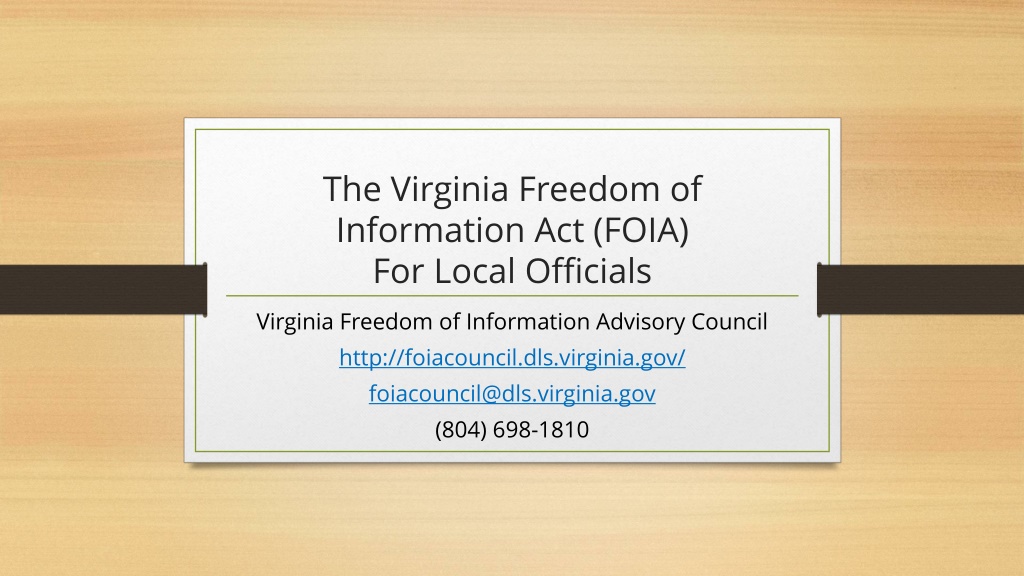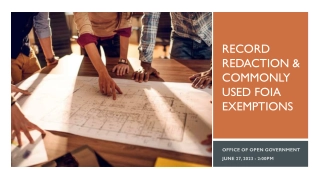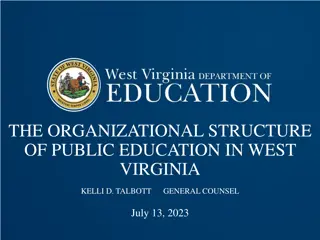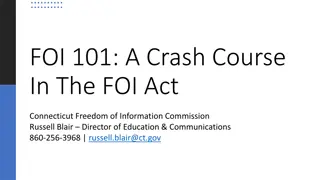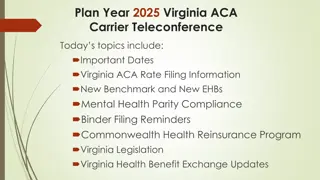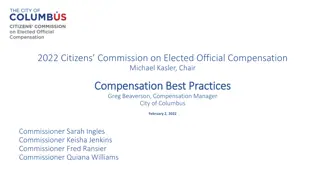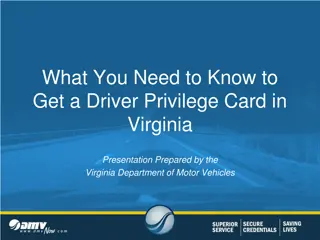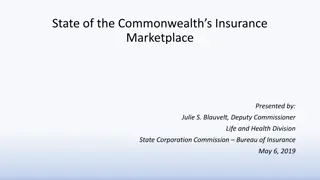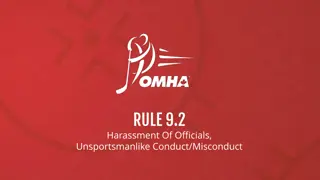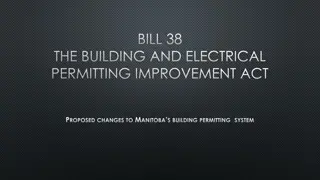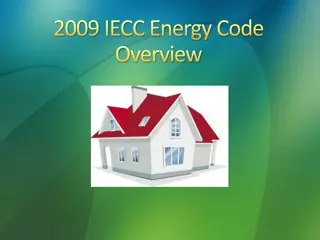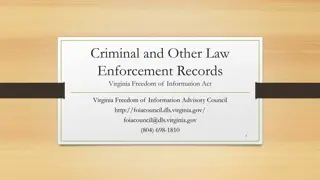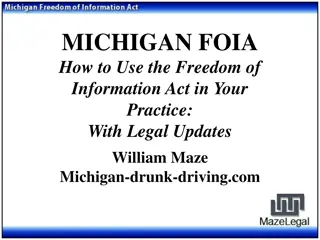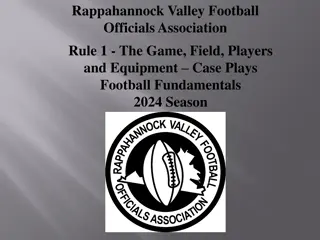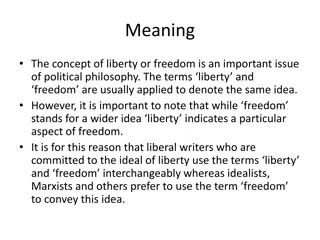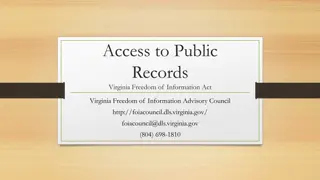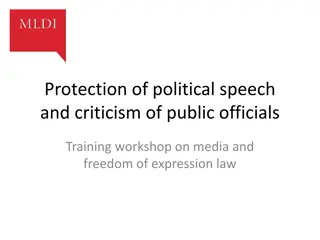Understanding Virginia's Freedom of Information Act (FOIA) for Local Officials
Explore the Virginia Freedom of Information Act (FOIA) as it pertains to local officials, covering requirements, public records, meetings, remedies, and penalties. Learn about the FOIA Council, its purpose, policies, structure, and educational resources. Discover the obligations and training requirements for local officials under FOIA regulations.
Download Presentation

Please find below an Image/Link to download the presentation.
The content on the website is provided AS IS for your information and personal use only. It may not be sold, licensed, or shared on other websites without obtaining consent from the author. Download presentation by click this link. If you encounter any issues during the download, it is possible that the publisher has removed the file from their server.
E N D
Presentation Transcript
The Virginia Freedom of Information Act (FOIA) For Local Officials Virginia Freedom of Information Advisory Council http://foiacouncil.dls.virginia.gov/ foiacouncil@dls.virginia.gov (804) 698-1810
Training Contents Introduction FOIA requirements for local officials Public Records Public Meetings Remedies and Penalties Other resources for further questions 2
Introduction About the FOIA Council Purpose and policy of FOIA Structure of FOIA how to find what you need within the Code General Provisions -- 2.2-3700 through 2.2-3703.1 Records Procedures and Exemptions -- 2.2-3704 through 2.2-3706.1 Training Requirements -- 2.2-3704.2 and 2.2-3704.3 Meetings Procedures and Exemptions -- 2.2-3707 through 2.2-3712 Remedies and Penalties -- 2.2-3713 through 2.2-3715 3
About the FOIA Council 30-178 through 30-181 State legislative branch advisory council Legislative forum for studies and recommendations to the General Assembly Answer questions from government, citizens, and media Publishes advisory opinions and educational materials Provides FOIA training presentations Not an investigative or enforcement agency 4
Purpose & Policy of FOIA 2.2-3700 Ready access to public records Free entry to meetings of public bodies FOIA is to be liberally construed to promote awareness of governmental activities and operations Any exemption from public access to records or meetings shall be narrowly construed No record shall be withheld or meeting closed to the public unless specifically made exempt 5
FOIA Requirements for Local Officials Note: Constitutional officers are subject to FOIA for records purposes only. Other local officials who are members of public bodies are generally subject to both the records and meetings provisions of FOIA. 6
Requirements for Local Officials 2.2-3704.3 Which local officials must receive training? Local elected officials; and The executive director and members of each industrial development authority and economic development authority; and Members of any boards governing any authority established pursuant to the Park Authorities Act. 7
Requirements for Local Officials (continued) 2.2-3704.3 Receive FOIA training from the FOIA Council or your local government attorney within two months of assuming office Training may be presented live or online Receive training again at least once every two (2) years since last training Clerk of the public body must keep records of training (name of the official, date of the training) for five years Note: There is no requirement to report training to the FOIA Council, only to keep your own records 8
Requirements for Local Officials (continued) 2.2-3702 All elected, reelected, appointed, and reappointed officials must: Be furnished by the public body's administrator or legal counsel with a copy of FOIA within two weeks following election, reelection, appointment, or reappointment; and Read and become familiar with the provisions of FOIA. A current copy of FOIA may be found on the FOIA Council website. 9
Other Laws May Also Apply Other laws may also affect access to public records and meetings, but which laws apply will vary depending on the type of record, type of meeting, and type of elected official. Because the FOIA Council s statutory authority is limited to providing advice and guidance regarding FOIA, there will be times when you need to consult others for advice. 10
Examples of Other Laws Court records are subject to laws in Titles 16.1 and 17.1 of the Code, as well as the Rules of the Supreme Court of Virginia Code 15.2-1415 through 15.2-1421 set out specific laws for meetings of local governing bodies Various provisions in Title 15.2 address public hearings Code 22.1-72 through 22.1-75 address school board meetings and procedures Code 58.1-3 prohibits the release of certain tax information 11
Public Records Recognizing and responding to FOIA requests 2.2-3704 through 2.2-3706.1
Introduction to Records & FOIA All public records are presumed open unless specifically exempt Definition of public record ( 2.2-3701) all writings and recordings that consist of letters, words or numbers, or their equivalent . . . however stored, and regardless of physical form or characteristics prepared or owned by, or in the possession of a public body or its officers, employees or agents in the transaction of public business. Note: draft versions are public records 13
Debunking FOIA myths FOIA addresses access to public records ( 2.2-3704) FOIA does not require you to answer questions, give interviews, or provide explanations Inspect or Copy (requester s choice) Not free public bodies may charge to produce public records FOIA exemptions generally do not prohibit release Informal vs. formal requests no difference 14
Who has the right to make a request under Virginia FOIA? Citizens of the Commonwealth Representatives of newspapers & magazines with circulation in the Commonwealth Representatives of radio & television stations broadcasting in or into the Commonwealth 15
Requests from out-of-state Best practice is to respond to out-of-state requesters even if they do not have access rights under Virginia FOIA Standardizes practices for internal consistency Out-of-state requester can get a Virginia citizen to make the same request anyway Do not have to follow FOIA procedure strictly since out-of-state requesters cannot enforce Virginia FOIA 16
Requesting Public Records How requests may be made: Requester must identify records with reasonable specificity Public body may require the requester s name & legal address A request does not have to be in writing or use any particular form A request does not have to say FOIA The requester s purpose does not matter Requester has the choice to inspect or to receive copies 17
Responding to Requests for Public Records Five working days to respond after request is received The first day to respond is the day after the request is received Weekends and legal holidays do not count as working days Failure to respond is deemed a denial of the request and a violation of FOIA Creation of new records not required Always allowed to make agreements with the requester on the production of records 18
Five Responses 1) Provide the requested records 2) Requested records are being entirely withheld 3) Requested records are being provided in part and withheld in part 4) Requested records could not be found or do not exist 5) Additional time needed to search for/produce records 19
Exemptions & Redaction 2.2-3704.01 Most FOIA exemptions are not prohibitions exempt records may be withheld, but they may also be released in the discretion of the custodian Only exempt portions of records may be withheld (redacted) An entire record may be withheld only if the entire record is exempt 20
Charges for Records Requests Public body may make reasonable charges not to exceed its actual cost incurred in accessing, duplicating, supplying, or searching for the requested records Cannot charge more than the actual cost to the public body Cannot charge for certain scholastic records if requested by parent or guardian (of minor student) or student (if 18 years or older) Public body shall make all reasonable efforts to supply the requested records at the lowest possible cost 21
Charges for Records Requests (continued) Before searching for records, must notify requester of public body s right to charge and requester s right to a cost estimate Must provide an estimate in advance if requested Public body may require an advance deposit if estimate is > $200 If a bill goes unpaid 30 days or more, do not have to respond to new requests until the outstanding balance is paid 22
Exemptions of General Application Personnel records - 2.2-3705.1 (1) Attorney-client privilege- 2.2-3705.1 (2) Legal memoranda and other work product - 2.2-3705.1 (3) Contract negotiations - 2.2-3705.1 (12) Procurement exemptions - 2.2-3705.6 (10) and (11) Account & routing numbers - 2.2-3705.1 (13) 23
Public Meetings Procedures for open, closed, and electronic meetings 2.2-3707 through 2.2-3712 24
Introduction to Meetings under FOIA Policy: All meetings must be open unless closed following an exemption 2.2-3700 Definitions of public body, meeting, and public business 2.2-3701 Open Meetings 2.2-3707 through 2.2-3710 Closed Meetings 2.2-3711 and 2.2-3712 Electronic Meetings 2.2-3708.2 and 2.2-3708.3 25
Definition of Public Body 2.2-3701 Any legislative body, authority, board, bureau, commission, district or agency of the Commonwealth or of any political subdivision of the Commonwealth, including cities, towns and counties, municipal councils, governing bodies of counties, school boards and planning commissions Any committee, subcommittee, or other entity however designated, of the public body created to perform delegated functions of the public body or to advise the public body 26
Definition of public body (continued) Also includes: Other organizations, corporations or agencies in the Commonwealth supported wholly or principally by public funds (may include tax-exempt organizations, for example) Constitutional officers are included, but only for records purposes 27
Definition of meeting 2.2-3701 Includes meetings including work sessions, when sitting physically, or through electronic communication means as a body or entity, or as an informal assemblage of (i) as many as three members or (ii) a quorum, if less than three, of the constituent membership, wherever held, with or without minutes being taken, whether or not votes are cast, of any public body quorum if less than three means two members , if they are a quorum of the public body (Ex. A subcommittee with only two or three members total would have a quorum of two members) Must be discussing or transacting public business in real time 28
Definition of meeting - Exceptions The following are not considered meetings subject to FOIA: Gatherings of employees (the meetings rules only apply to members of the public body, not staff) Gatherings where no part of the purpose is the discussion or transaction of any public business, the gathering was not called or prearranged with any purpose of discussing or transacting any business of the public body, and no discussion or transaction of public business takes place among the members of the public body A public forum, informational gathering, candidate appearance, meeting of another public body, or debate, the purpose of which is to inform the electorate and not to discuss or transact public business 29
Definition of meeting Public business For purposes of public meetings only, public business means any activity a public body has undertaken or proposes to undertake on behalf of the people it represents Note: This definition of public business was added to the definition of meeting in 2024 in response to Gloss v. Wheeler (Va. 2023), in which the Virginia Supreme Court stated that for a topic to constitute public business it must not just be something that conceptually could at some point come before a public body, but rather, the topic must be something that is either before the public body or is likely to come before the body in the foreseeable future 30
Open Meetings - Requirements Notice to the Public Note that notice to members is not covered by FOIA, but is often stated elsewhere in other laws Open to the Public "Open meeting" or "public meeting" means a meeting at which the public may be present Minutes 31
Notice Requirements 2.2-3707 Contents: date, time, and location of the meeting For local public bodies, FOIA requires notice to be posted in three locations: 1. Official public government website, if any; 2. Prominent public location in which notices are regularly posted; and 3. At the office of the clerk of the public body OR at the office of the chief administrator 32
Notice Requirements (continued) Regular meetings post three working days before the meeting Note: Do not count the day of the meeting as one of the working days Special, emergency, or continued meetings two elements: Notice must be reasonable under the circumstance (varies with circumstances) Public notice must be posted at the same time the members are notified Direct notice to those who request it (usually by an email list) 33
What does it mean for a meeting to be open to the public? Open meeting or public meeting means a meeting at which the public may be present - 2.2-3701 Must allow public to record, photograph, film, or otherwise reproduce FOIA does not address logistics such as room capacity Public bodies are encouraged to use additional means to increase public awareness (Ex. Live streaming online, broadcasting using television or radio, posting recordings of meetings, etc.) 34
Meeting Minutes Only required to be taken at open meetings Not required for study commissions, committees, or subcommittees appointed by local governing bodies or school boards, except where the membership of any such commission, committee or subcommittee includes a majority of the governing body or school board Must be posted on the public body s official public government website within 7 days of final approval If the public body has no such website, then must be made available at a prominent public location in which meeting notices are regularly posted or the office of the clerk or chief administrator 35
Meeting Minutes (continued) Contents must include: Date, time, location of the meeting Members of the public body present and absent A summary of matters discussed, deliberated, or decided A record of any votes taken Any motions to enter into a closed meeting and certification after a closed meeting 36
Agendas At least one copy of the proposed agenda and all agenda packets and, unless exempt, all materials furnished to members of a public body for a meeting shall be made available for public inspection at the same time such documents are furnished to the members of the public body FOIA does not have requirements regarding specific agenda items, agenda contents or agenda changes FOIA does not address parliamentary procedure 37
Closed Meeting Procedures Motion, Discussion, Certification 2.2-3711 and 2.2-3712 38
Motion to Enter into a Closed Meeting 2.2-3712 (A) Public body must take an affirmative recorded vote in an open meeting approving a motion that: 1. Identifies the subject matter for the closed meeting; Must be more than quoting or paraphrasing the exemption 2. States the purpose of the closed meeting; and Quoting or paraphrasing the exemption does state the purpose 3. Makes specific reference to the applicable exemption from the open meeting requirements 39
Closed Meeting Discussions 2.2-3712 Restricted to those matters specifically exempted from the provisions of FOIA and identified in the motion (do not stray off topic) Minutes are not required, and if taken, are exempt from FOIA Who may attend? Nonmembers if they are necessary or will aid consideration of the topic Other members of public bodies may attend, but not participate in, closed meetings of committees, subcommittees, and other sub-entities of the parent body 40
Certification of a Closed Meeting 2.2-3712 (D) At the conclusion of a closed meeting, public body must certify that the only things heard, discussed, or considered in the closed meeting were: 1. Public business matters lawfully exempted from the open meeting requirements, and 2. Such public business matters as were identified in the motion by which the closed meeting was convened Extra penalty for improper certification 41
Voting 2.2-3710 & 2.2-3711 (B) All votes taken to authorize the transaction of any public business must be taken and recorded in an open meeting No written or secret ballots May take straw polls or reach consensus in closed meetings Decisions made in closed meetings are not effective until a vote is taken at an open meeting ( 2.2-3711 (B)) 42
Commonly Used Exemptions (Note: All meeting exemptions in FOIA are set out in 2.2-3711) Discussion of personnel - 2.2-3711 (A) (1) Discussion concerning scholastic records/students - 2.2-3711 (A) (2) Consideration of acquisition or disposition of real property - 2.2-3711 (A) (3) Discussion of prospective business or industry - 2.2-3711 (A) (5) Actual or probable litigation - 2.2-3711 (A) (7) Specific legal matters - 2.2-3711 (A) (8) Public safety issues - 2.2-3711 (A) (19) Discussion of award of public contract - 2.2-3711 (A) (29) 43
Electronic Meetings 2.2-3708.2 and 2.2-3708.3 As of September 1, 2022, there are three general categories: Remote participation: participation by an individual member of a public body by electronic communication means in a public meeting where a quorum of the public body is otherwise physically assembled All-virtual public meetings: a public meeting (i) conducted by a public body, other than those excepted pursuant to subsection C of 2.2-3708.3, using electronic communication means, (ii) during which all members of the public body who participate do so remotely rather than being assembled in one physical location, and (iii) to which public access is provided through electronic communication means States of emergency declared by the Governor or the locality 44
Electronic Meetings Remote participation (may be used by any public body) - 2.2-3708.3 Four allowed reasons for remote participation: Personal matter that prevents attendance Medical condition or disability that prevents attendance Medical condition of a family members that prevents attendance Principal residence is 60 miles or more from the main meeting location All of these require a physical quorum and a participation policy Persons with disabilities and their caregivers who participate remotely are counted as if physically present for purposes of determining whether there is a quorum Remote location does not have to be open to the public Personal matters may be used twice per calendar year per member or 25 percent of the meetings of the public body rounded to the next whole number, whichever is greater 45
Electronic Meetings All-virtual public meetings - 2.2-3708.3 May be used by any public body except local governing bodies, local school boards, planning commissions, architectural review boards, zoning appeals boards, and boards with the authority to deny, revoke, or suspend a professional or occupational license Requires a participation policy (but no quorum) Remote locations do not have to be open to the public unless 3 or more members present at that location All-virtual public meetings may be used twice per calendar year per member or 50 percent of the meetings of the public body rounded to the next whole number, whichever is greater Additional procedural requirements 46
Electronic Meetings Policy for remote participation and all-virtual public meetings - 2.2-3708.3 (D) Before using remote participation or all-virtual public meetings, the public body must adopt a policy on participation at least once annually that: Is applied strictly and uniformly, without exception, to the entire membership and without regard to the identity of the member or the matters to be considered or voted upon Describes the circumstances under which an all-virtual public meeting and remote participation will be allowed and the process the public body will use for making requests to use remote participation, approving or denying such requests, and creating a record of such requests Fixes the number of times remote participation for personal matters or all-virtual public meetings can be used per calendar year, not to exceed the limitations set forth in FOIA Does not prohibit or restrict any individual member of a public body who is participating in an all-virtual meeting or who is using remote participation from voting on matters before the public body 47
Electronic Meetings During declared states of emergency ( 2.2-3708.2 and State Budget) During a Governor-declared or local state of emergency: Purpose: to provide for the continuity of operations of the public body or the discharge of its lawful purposes, duties, and responsibilities- 2.2-3708.2 (A) (3) (version in FOIA amended in 2021) During a Governor-declared state of emergency ONLY Different procedural requirements and limitations State Budget Item 4-0.01 (g) (version in the state budget originally added in 2020) Both may be used by any public body No requirement for a physical quorum or to have a policy in place 48
Electronic Meetings (continued) Members may monitor (listen/watch) even if they cannot participate Public & staff participation is always allowed restrictions only apply to members Please see our Electronic Meetings Guide for a more detailed discussion 49
A note about FOIA & Social Media Because the definition of public records includes all types of records that are in the transaction of public business, various forms of social media may be public records Because any assemblage of three or more members (or a quorum of two) of a public body discussing or transacting public business simultaneously is a meeting subject to FOIA, social media may also be used to conduct meetings Please see our guide on FOIA & Social Media for a more detailed discussion
